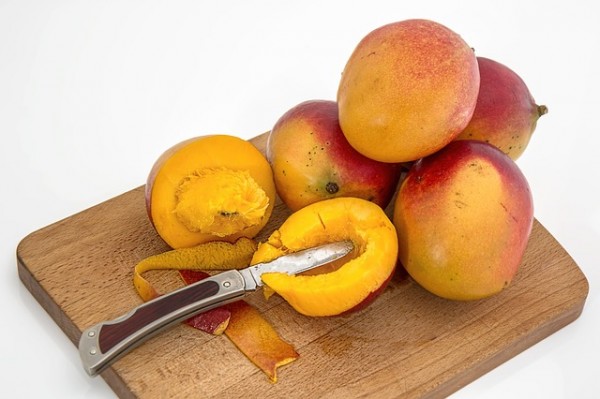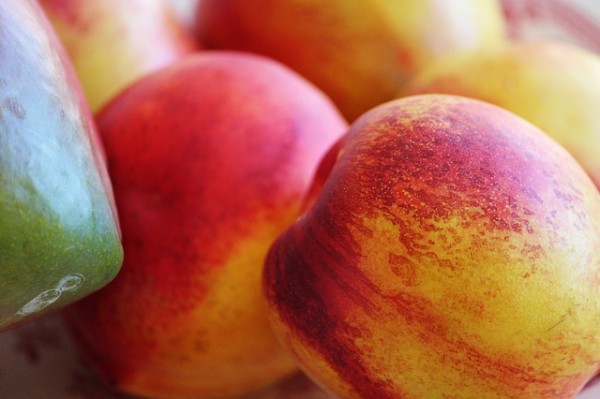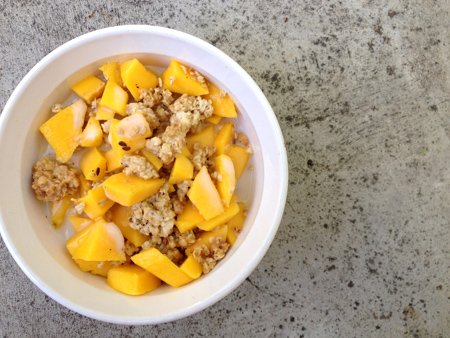
John Turrell, the Wellness Coordinator at the Greater Portland Branch of the YMCA of Southern Maine wants us to feel healthier and be a little adventurous, so he’s encouraging us to try (or retry) nine new healthy foods. We’re on number five — mangoes.
Guest post by John Turrell, Wellness Coordinator, Greater Portland Branch, YMCA of Southern Maine.
Aaah … mangoes. These honey-sweet, smooth-textured tropical fruits were originally grown in the sub-Himalayan plains of India. They are now produced in tropical areas all around the world and are often called “the king of the fruits.” Worldwide, mangoes are so popular they’re recognized as the national fruit of India, Pakistan, and the Philippines.
Mangoes are nutritionally rich with unique flavor, fragrance, taste and health-promoting qualities. The orange-yellow fruit is rich in:
- Dietary fiber
- Vitamins
- Minerals
- Antioxidant compounds.
Mango is an excellent source of:
- Vitamin A
- Flavonoids
- beta-carotene
- potassium
- vitamins B6, C, and E.
Mango peels are also rich in phytonutrients. Their natural sweetness makes them a fresh and nutritious way to satisfy your sweet-tooth.

The outer skin is smooth and green in unripe mangoes but turns into golden yellow, bright orange or orange-red when ripe. Unripe mangoes can be kept at room temperature for days to ripen. Ripe mangoes should be kept stored in the refrigerator. Bring back to room temperature when the fruit is to be eaten to enjoy the natural taste and flavor.
Besides eaten plain as a snack or dessert, fresh diced mango can be added to salsa or salad. Frozen mangoes can be blended into a delicious and healthy smoothie. So, cool off your taste buds and sweeten your day with a “king of the fruits” – mango.
To help you get started with John’s advice here is a recipe from Oldways. This week they’re celebrating African Heritage and Health week. On the Oldways website, you’ll find several African recipes and information about the health benefits of an African heritage diet. One of the recipes includes mangoes!
African Heritage Mango & Papaya After-Chop Recipe
African heritage desserts have traditionally been based on fresh fruit. A common dessert in West Africa, the “after-chop” is a fresh fruit salad with coconuts, peanuts and honey mixed together loaded with flavor and nutrition. Which means you can feel good about treating your sweet tooth after a meal.
Oldways
Ingredients
- 1/4 of papaya or one peach, chopped into cubes
- 1 mango, skin peeled and chopped into cubes
- 1 TBS coconut milk
- 1/2 tsp honey or maple syrup
- 1 TBS chopped peanuts
Instructions
- Cut open the papaya. Scoop out the black seeds in the center.
- Slice the skin off with a serrated knife.
- Slice lengthwise into quarters and chop into bite-size cubes.
- Peel the mango with a knife or a peeler.
- Slice the fruit from the pit and chop into bite-size cubes.
- Place the fruit in a bowl.
- Drizzle the coconut milk, honey, and peanuts over the fruit.
- Stir to coat.
- Serve immediately or chill in the fridge up to two days.
- Serving size: One bowl
- Calories: 100
- Fat: 1g
- Saturated fat: 1g
- Carbohydrates: 25g
- Sugar: 20g
- Sodium: 5mg
- Fiber: 3g
- Protein: 1g
- Cholesterol: 0mg
Substitute any of your favorite in-season fruits for this medley. Blueberries, peaches, and bananas are great options. You can also add granola to enjoy it as a delicious, summertime breakfast!
Oldways
Thank you for reading John’s guest post about delicious, healthy mangoes. How do you like to eat mangoes? Have you ever tried one? And in case you missed it, here’s the link to last week’s healthy food — avocados.



Thank you for the tip on how to tell when a Mango is ripe. I tend to stay away from them because I don’t know what is considered “ripe.” Now I may look for ripe ones in the stores or wait patiently for them to ripen.
Mangoes, to me, are like cantaloupe. They can be either fresh, ripe and mouth-wateringly delicious or tasteless. I have enjoyed fresh mangoes in Florida that spoiled me to the great taste of perfectly ripe ones.
This morning I cut up four slices of dried mangoes (without additives from Trader Joe’s) and put them on my oatmeal before microwaving it. Then I added sliced bananas. What a great mid-winter breakfast!
I’ve been putting them in breakfasts smoothies with bananas and Greek yogurt. So delicious!